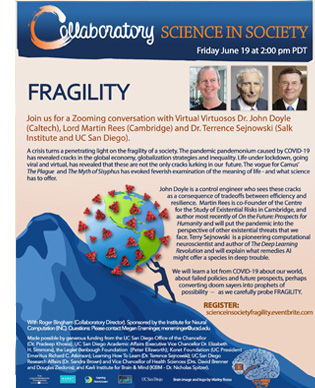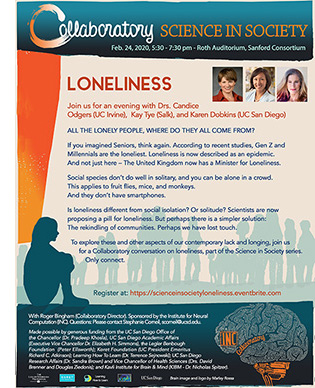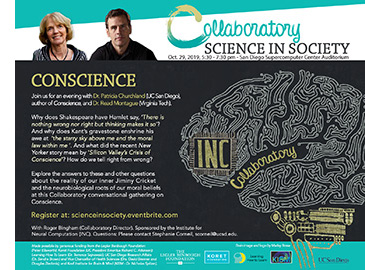the COLLABORATORY is a Center within the Institute for Neural Computation (INC) at UC San Diego, where science gets cultured — and the culture gets science. The mission of the COLLABORATORY is to bridge the chasm between the creators and the consumers of science and technology.
the COLLABORATORY is a venue dedicated to facilitating a constructive conversation between scientists, educators, politicians, academics, students, industry, and the lay public, an innovative incubator for ideas and activities that encourage transparency, build trust, and enlarge the constituency of reason.
A key element is the creation of burgeoning movement of scientifically and culturally literate students from diverse disciplines and backgrounds possessing a fluency in the role of science in the larger culture who could act as explorers and ambassadors in whatever role they later assumed – as teachers, researchers, business leaders, politicians, physicians, lawyers, communicators. Citizens with agile minds prepared to engage Tomorrow’s World. Science In Society scholars acting as agents of change at a time of cultural evolution.
Made possible by generous funding from the Legler Benbough Foundation (Peter Ellsworth); Koret Foundation (UC President Emeritus Dr. Richard C. Atkinson); Learning How To Learn (Dr. Terrence Sejnowski); UC San Diego Office of Research Affairs (Dr. Sandra Brown) and Vice Chancellor of Health Sciences (Drs. David Brenner and Douglas Ziedonis); and Kavli Institute for Brain & Mind (KIBM - Dr. Nicholas Spitzer). Brain image and logo by Marley Rossa.
the COLLABORATORY Events:
 FRAGILITY
FRAGILITY
Join us for a Zooming conversation with Virtual Virtuosos Dr. John Doyle (Caltech), Lord Martin Rees (Cambridge), Patricia Churchland (UC San Diego), and Dr. Terrence Sejnowski (Salk Institute and UC San Diego). June 19, 2020, 2:00 PM - 4:00 PM PDT. Click here for flier
A crisis turns a penetrating light on the fragility of a society. The pandemic pandemonium caused by COVID-19 has revealed cracks in the global economy, globalization strategies and inequality. Life under lockdown, going viral and virtual, has revealed that these are not the only cracks lurking in our future. The vogue for Camus’ The Plague and The Myth of Sisyphus has evoked feverish examination of the meaning of life - and what science has to offer.
John Doyle is a control engineer who sees these cracks as a consequence of tradeoffs between efficiency and resilience. Martin Rees is co-Founder of the Centre for the Study of Existential Risks in Cambridge, and author most recently of On the Future: Prospects for Humanity and will put the pandemic into the perspective of other existential threats that we face. Terry Sejnowski is a pioneering computational neuroscientist and author of The Deep Learning Revolution and will explain what remedies AI might offer a species in deep trouble.
We will learn a lot from COVID-19 about our world, about failed policies and future prospects, perhaps converting doom sayers into prophets of possibility -- as we carefully probe FRAGILITY.
Two parts, below: LONELINESS
LONELINESS
Join us for an evening with Drs. Candice Odgers (UC Irvine), Kay Tye (Salk), and Karen Dobkins (UC San Diego).
February 24, 2020, 5:30 PM - 7:30 PM, Roth Auditorium at Sanford Consortium. Click here for flier
ALL THE LONELY PEOPLE, WHERE DO THEY ALL COME FROM?
If you imagined Seniors, think again. According to recent studies, Gen Z and Millennials are the loneliest. Loneliness is now described as an epidemic. And not just here – The United Kingdom now has a Minister for Loneliness.
Social species don’t do well in solitary, and you can be alone in a crowd. This applies to fruit flies, mice, and monkeys. And they don’t have smartphones.
Is loneliness different from social isolation? Or solitude? Scientists are now proposing a pill for loneliness. But perhaps there is a simpler solution: The rekindling of communities. Perhaps we have lost touch.
To explore these and other aspects of our contemporary lack and longing, join us for a Collaboratory conversation on loneliness, part of the Science in Society series. Only connect.
Click here to read an excerpt from INC's newsletter, the INCubator, about this event: "COLLABORATORY Explores Loneliness"
 CONSCIENCE
CONSCIENCE
Join us for an evening with Dr. Patricia Churchland (UC San Diego), author of Conscience, and Dr. Read Montague (Virginia Tech). October 29, 2019, 5:30 PM - 7:30 PM, San Diego Supercomputer Center Auditorium, UC San Diego. Click here for flier
Why does Shakespeare have Hamlet say, ‘There is nothing wrong nor right but thinking makes it so’ ? And why does Kant’s gravestone enshrine his awe at ‘the starry sky above me and the moral law within me’ ? And what did the recent New Yorker story mean by ‘Silicon Valley’s Crisis of Conscience’? How do we tell right from wrong?
Explore the answers to these and other questions about the reality of our inner Jiminy Cricket and the neurobiological roots of our moral beliefs at this Collaboratory conversational gathering on Conscience.
Click here to read an excerpt from INC's newsletter, the INCubator, about this event: "COLLABORATORY Throws its First Science in Society Event "
These videos can also be found on the Collaboratory YouTube Channel!
